Health
Drug abuse among Nigerian youths becoming alarming; parents, schools need to join fight – Rescue Nigeria
Published
6 months agoon
A group, Rescue Nigeria, has lamented that drug abuse among Nigerian youths is becoming alarming; saying that parents, schools should join the fight against drug abuse in the country.
Biodun Durojaiye and Tunde Odediran, in a statement for Rescue Nigeria (an organ of the Initiative for Good and Informed Citizenship), raised an alarm that Nigeria is facing a fast-spreading scourge of substance abuse among the young population – higher than the global average and requiring a concerted effort to reverse – in a dark world not navigated by parents, guardians or schools.
The statement indicated that the People’s Parliament, a quarterly public discussion about important problems facing the country, attended by Nigerians at home and in the diaspora, concluded that without collaboration by the family, school system, faith-based organizations, community groups, traditional institutions and the government, Nigeria can easily go down the road of out-of-control violence, crime, wasteful expenditure and broken family relationships.
Describing how staggering the problem has become, one of the panelists, the Director of Media and Advocacy at the National Drug Law Enforcement Agency (NDLEA), Mr. Femi Babafemi, disclosed that five years ago, more than 14 million Nigerians were already using illicit drugs, three times the global average.
READ ALSO: Man, 38, hangs self to death in Gombe
According to the NDLEA communications director: “In the last 33 months alone, the agency (NDLEA) has arrested more than 37,000 offenders. And when you also look at the volume of drugs, illicit drugs seized within the same period is almost over 7 million kilograms, about 7,000 tonnes. That shows you that, indeed, we have quite a problem on our hands.
“And I also tell you that within this same period, we’ve had more than 7,000 persons successfully prosecuted and convicted with billions worth of assets seized from them while we still have more than 11,000 of such cases still going on in the courts.”
Other panelists at the event include Dr. Charles Umeh, a consultant clinical psychologist at the Lagos University Teaching Hospital, Idi-Araba, and Senior Lecturer at the Department of Psychiatry, College of Medicine, University of Lagos; Dr. Gbenga Shadare, a sociologist and lecturer at the Buckinghamshire New University, UK; and Mr David Folaranmi, a mental health advocate and founder of the David Folaranmi Foundation.
The People’s Parliament has been organized for almost two years by the Initiative for Good and Informed Citizenship, a civil advocacy group formed to educate and empower Nigerians about social and political issues.
Many Nigerians are avoiding an open discussion about the scourge, but as they do that, the problem of drug abuse gets even worse, participants observed. According to Mr. Folaranmi, who recovered from substance abuse before being trained by the United Nations Office on drugs and crime, kids as young as 11 years are now abusing substances.
Folaranmi, who was invited to the Presidential Villa in Abuja in 2022 to share his experience, narrated how kids are being exposed to drugs at a very young age. He was at a school attended by children of affluent parents in Lagos to deliver a lecture on drug use, when he was approached by one of the female students.
“She said, ‘sir, I need to speak to you.’ I replied, ‘what’s the problem?’ She said, ‘Sir, I started using drugs two years ago. I started drinking Hennessy two years ago and then it progressed to marijuana.’ She said, ‘Sir, now I’m using cocaine. And right now, I can’t study without using cocaine.’ So, I asked her how old she was. She told me she was 11, which meant that two years ago, when she was nine, she started drinking Hennessy within the space of two years, she started using marijuana and now cocaine.”
Dr Umeh, who is the Chairman of the Nigerian Association of Clinical Psychologists, Lagos State Chapter, explained how the journey into drug abuse can be progressive, steady and dangerous.
“Drugs usually make you feel high and energetic. And once they’re not in the system, they tend to slow your system down, and you start feeling restless… So, if they’re not there, the body will begin to malfunction. Because of that, you need to look for it anyhow, anywhere. And that leads to what we call dependence and what we generally call addiction. You need more to function because they are now part of you. So invariably, what we are advocating for is understanding what the categories of psychotic substances are and avoiding them like a plague. Because once you start using, they begin to control you. You can’t control them anymore. That is the danger.”
The discussants recognized that the drug trade is no longer one that uses Nigeria as a route to other countries, but one in which Nigerians are now the users.
Dr. Shadare, a sociologist, said, “The drug industry itself is huge. And those who are profiting from it are part of the problem. And unless we have a system by which we can apprehend and bring those people to book, it will take a while before we can address this issue.”
But the NDLEA spokesperson, Mr. Babafemi, said the drug enforcement agency is already going after the dealers, observing that until there is a concerted effort to address the problem from the root, it will be an arduous effort to just enforce the law when young people are inventing new ways to buy and sell drugs online.
“We know from our operations that these drugs are available online, on the dark web. These kids, especially when you talk of Gen Z, the Internet children, know how to go about these things,” adding that the NDLEA is embedded in many of the channels, tracking the movement of drugs, making arrest, but the global network of drug trade is complex, vast and sometimes ahead of detection.
READ ALSO: Obi gaslight Nigerians with false claims, innuendos – Tinubu
Giving further details of the vastness of the drug trade and how the NDLEA is shutting it down, he remarked: “Just a few months ago, the biggest consignment of cocaine ever in the history of Nigeria was made by the NDLEA in a location in Ikorodu. That’s over 2,135 tons of cocaine -2,135 kilograms. I mean, that’s a consignment worth millions of dollars. We’ve made big arrests, people are in prison, as we speak, and they are facing a trial. I mean, billionaires who are the brains behind the biggest import of opioids into Nigeria, those who could afford to bring in Tramadol, worth over 20 billion naira – we’ve arrested them. And as we speak, as we are right here today, an operation is going on in Lagos where we’ve also intercepted another consignment of Tramadol in FESTAC area of Lagos, again, worth billions.”
In spite of all these enforcement activities, Mr. Babafemi still agreed with the other panelists that more problems will be solved through public education and orientation.
The UNILAG clinical psychiatrist, Dr. Umeh, remarked that without education, current efforts will be inadequate because Nigeria does not have sufficient human and material resources to deal with the problem as it gets even worse.
“First, for those ones that have withdrawal syndrome, you admit them in the hospital for detoxification so that you clear the active substances in their system. That is the first phase. The next one is rehabilitation and reintegration. You have to let them function, go back to the original functional state before they started using drugs. We don’t have such facilities in the country. Now, the private ones that are springing up are too expensive for the public to access.
Now, let’s look at distribution of federal neuropsychiatry hospitals in the whole nation. I think you can get one across the geopolitical zone. Now, consider that number to the rising number of drug cases in the country. What can they do? Now, the teaching hospitals just have mediator psychiatry departments. They are not established to handle long stay patients – and most drug care cases are long stay. And that’s why when you take them to such facilities, they recover, they go back two months, they’re back. Because once they are supposed to be discharged from such hospitals to the rehab home, where they are going to be managed and now reintegrated into the society so that they become functional again. We don’t have such facilities.”
Dr. Shadare opined that the family unit is the strongest defence against drug use, with strong religious institutions that are aligned to the family network – with informal ways of support through NGOs, civil society organizations and investments by the government as advocated by Dr. Umeh. He also asked for the stigma attached to being involved in drugs to be deemphasized.
Mr. Folaranmi remarked that a drug problem should not be regarded as a death sentence. “You can come out of it. People have come out of it and are doing very well now. Please seek professional help.” However, he asked for massive public education, starting from primary through secondary education and religious bodies to guide young people early through the minefield of drug addiction.
Agreeing with the other panelists, the NDLEA director advocated “intentional parenting,” where parents are more involved in raising their children as a bulwark against illicit drug use in the society. He also asked every Nigerian to get involved in enlightenment, advocacy and education, adding that drug prevention is as important as enforcement.
“There is no way we can run away from the issue of prevention. If today we have more than 200 million people, I would say about 15 million people are abusing illicit substances. What happens to the remaining 185 million? That means we still have the majority who are not using drugs, who need to target those who are, to ensure that indeed we don’t have them fall into that particular gap.”
Rescue Nigeria group announced that its next step in its advocacy against illicit drug use by young people is to start a campaign in collaboration with allies, through which messages against substance abuse can penetrate the various demographics that make up Nigeria.
You may like
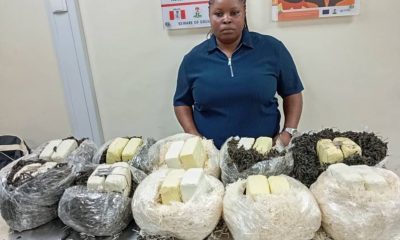

NDLEA busts Qatar-bound illicit drugs concealed in African salad, dried vegetables
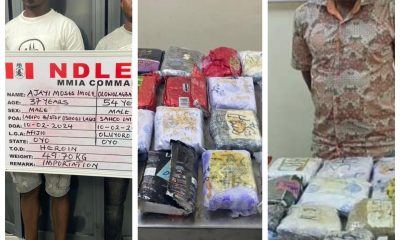

NDLEA intercepts largest consignment of heroin at Lagos airport, arrests 4 cartel members
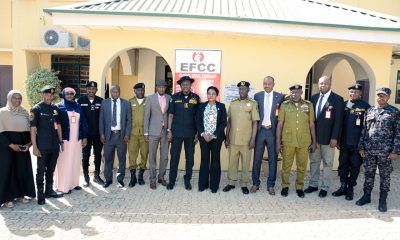

NDLEA intercepts cocaine, tramadol shipments in Lagos, Kano


NDLEA nabs Abia drug dealer, seizes 1.217 kilos of drugs


Ex-Beauty Queen Aderinoye declared wanted for drugs
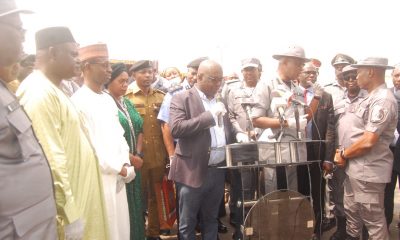

NDLEA, Customs synergy a strong warning to drug cartels, Marwa, Adeniyi declare
Trending

 Health & Fitness4 days ago
Health & Fitness4 days agoMalaria Vaccines in Africa: Pastor Chris Oyakhilome and the BBC Attack

 Aviation6 days ago
Aviation6 days agoWhy some airlines are avoiding Nigeria’s airspace–NAMA

 Featured1 week ago
Featured1 week agoPolice reportedly detain Yahaya Bello’s ADC, other security details

 Aviation5 days ago
Aviation5 days agoJust in: Dana airline crash lands in Lagos

 Aviation5 days ago
Aviation5 days agoNSIB begins investigation into Dana Air after crash-landing incident

 Business1 week ago
Business1 week agoDebt servicing gulps 56% of Nigeria’s tax revenue, says IMF

 Aviation5 days ago
Aviation5 days agoJust In: Dana Air plane crash-lands in Lagos
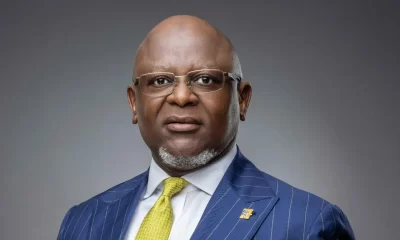
 Business1 week ago
Business1 week agoAdesola Adeduntan steps down as FirstBank CEO

